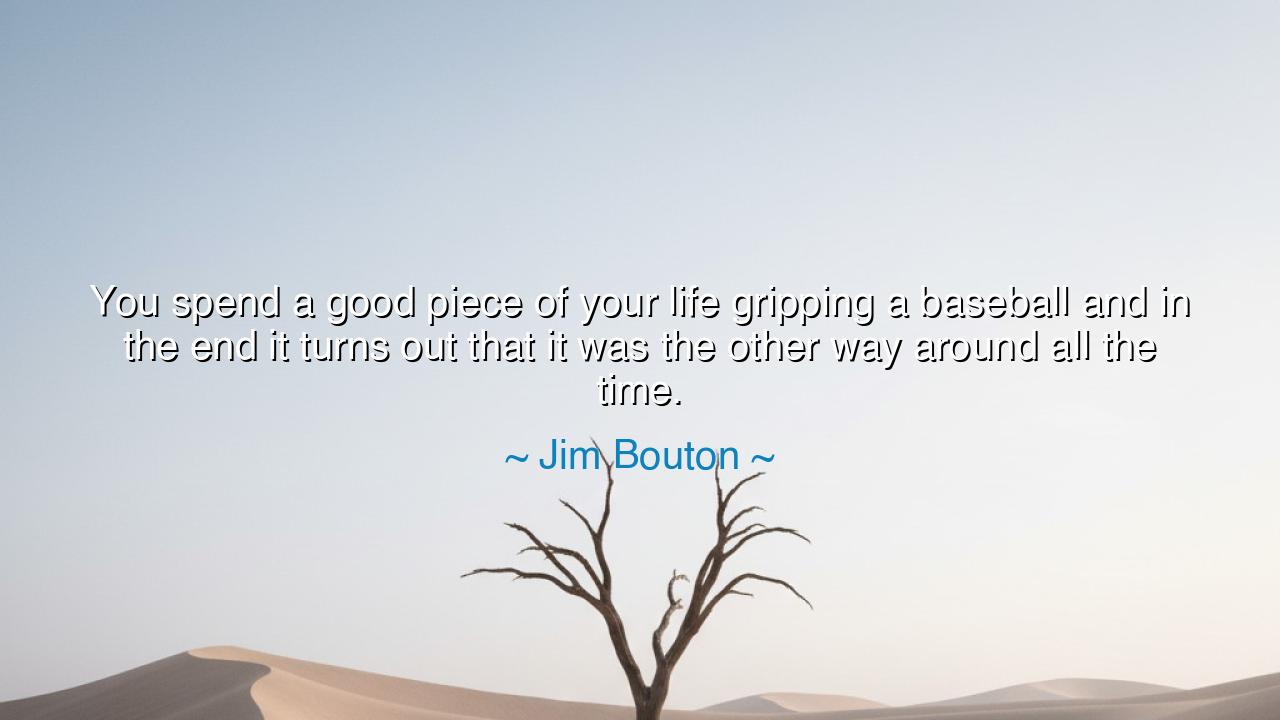
You spend a good piece of your life gripping a baseball and in
You spend a good piece of your life gripping a baseball and in the end it turns out that it was the other way around all the time.






"You spend a good piece of your life gripping a baseball and in the end it turns out that it was the other way around all the time." These words spoken by Jim Bouton, a former professional baseball player, capture a deep and ironic truth about life and the pursuit of mastery. At first glance, the statement seems like a reflection on the game of baseball itself — a game of skill, precision, and relentless practice. Yet, beneath the surface, it speaks to the larger human experience: the idea that we often grip tightly onto things in life — be they goals, ambitions, or relationships — only to discover, perhaps too late, that they were never truly in our control. Instead, it is life, with its twists and turns, that grips us, leading us through experiences we could never fully predict.
The origin of this truth lies in the human condition itself. Since the dawn of time, men and women have strived to master the world around them. Hercules, that great mythic hero, labored under seemingly impossible tasks, yet his ultimate realization was that even his greatest feats were shaped by forces far beyond his control. Bouton’s reflection on baseball mirrors this ancient wisdom: the belief that we, despite our best efforts to dominate or control our circumstances, are often at the mercy of forces much greater than ourselves. The struggle, the effort, the sweat — these are not wasted, but they may not lead us to the outcomes we expected.
Consider the life of Alexander the Great, who set out to conquer the known world with a firm hand, yet found himself at the mercy of his own desires and the overwhelming complexity of his empire. Though his ambition led him to uncharted lands, it was the very forces of nature, of human nature, that shaped the course of his reign. Alexander, like Bouton, might have once believed that his grip on the world — his military strategies, his keen intellect, his personal charisma — would shape his destiny. Yet, by the end of his life, his plans lay in ruins, his empire fragmented, and his legacy not entirely what he envisioned. In the end, it was life — not Alexander — that gripped him, steering him toward an uncertain fate.
This concept of gripping tightly and ultimately being held by forces outside our control is echoed in the lives of many throughout history. King Solomon, renowned for his wisdom, once said, “Vanity of vanities, all is vanity.” In his wisdom, Solomon recognized the futility of human endeavors that seem so important in the moment — wealth, power, success — only to find that these are but fleeting shadows. The lesson here is clear: no matter how tightly we hold onto our dreams, ambitions, or goals, the nature of life often turns these desires on their heads, reminding us that we are but players in a much larger game. Solomon, like Bouton, teaches us that it is not the object of our grip but the nature of life’s unfolding that truly shapes our destiny.
The irony of Bouton’s words lies in the revelation that even in the moments of our greatest efforts, we are, in some ways, powerless. We might spend years honing our skills, whether in baseball, career, or personal pursuits, believing that through mastery we can control the outcome. Yet, as Bouton reveals, sometimes it is not the object we hold so tightly, but the object that holds us, guiding us to unexpected lessons and outcomes. This echoes the wisdom of the Taoists, who taught that “Wu Wei”, or effortless action, is the highest form of living. Rather than striving to control everything, one must learn to flow with the forces of life, allowing them to lead us where we must go.
As we consider Bouton’s reflection, we are reminded of the importance of humility in our endeavors. Life does not unfold according to our plans, and no matter how hard we grip the ball, it may slip from our fingers when we least expect it. Just as Bouton learned through the sport of baseball that his grip was never fully in his control, so too must we learn that the forces of life — whether in career, relationships, or personal aspirations — are not easily mastered. The lesson here is not to relinquish our efforts or abandon our dreams but to accept that the outcome is not ours alone to command. We must act with determination, but we must also yield to the natural flow of life.
So, what is the practical action we must take from Bouton’s wisdom? First, we must embrace life’s uncertainties and acknowledge that while we cannot control the final outcome, we can shape the journey. Like Bouton gripping the baseball, we should not be afraid to hold onto our goals with passion, but we must also remember that the game — like life — is filled with variables beyond our control. In the end, life grips us, and it is through learning to adapt and flow with it that we truly find meaning and fulfillment. Grasp the ball, but do not mistake it for the entire game. Live fully, knowing that the journey itself, not the outcome, is where true wisdom lies.






AAdministratorAdministrator
Welcome, honored guests. Please leave a comment, we will respond soon